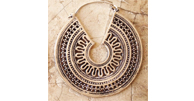Gelawezh: The difficult times of life, the oppression and persecution and violation of Kurdish individuals’ rights forced the Kurdish nation to defend their legitimate rights. And this resistance was possible through struggle and effort. This oppression of the former regime in Baghdad against the Kurdish nation did not spare us, as it did not spare Kurdish families.
Certainly, as a Kurdish woman, I was raised in a nationalist Kurdish family and this made us always support our brothers and relatives in the struggle and resistance against the repression of this Baath regime against the Kurdish nation.
The initiation and end of any political attempt requires struggle. So, due to this effort by us, we ended up in jail. When we were imprisoned it was in 1988 and that coincided with the days of struggle and Anfal and the chemical bombardment catastrophes.
In an early morning at the end of May, the men of the Baath regime besieged our house, on the pretext that my brother might secretly be involved in some political activity. In fact, this accusation came from some of his co-workers, who had been apprehended. It turned out they had not caught my brother, so they surrounded our house. First, in a very wild manner, they attacked my father who was 65 years old. They took him to the Erbil Security Directorate. Only after a quarter hour, when some Kurdish mercenary accompanied by a security lieutenant of the Saddam’s regime came, they arrested us and even took the infant in the cradle to jail.
In fact, I was a university student at that time, studying at the Salahaddin University. It was 7 o’clock in the morning when they attacked our house. The Baath agents had the mercenaries overrun the lane and the roofs of the neighbors. In some of their cars they took us to the Erbil Security Directorate. We stayed there until 11 p.m. After a strict investigation of my father and when they failed to get any information from him, they started to question us so that through us they could obtain information about my brother and his friends, because at that time my brother was the secret official of the city and some people had reported him.
The place where we were held had previously been a place for raising cattle and it did not have any health services. This caused us several diseases, especially skin conditions.
In fact, the number of prisoners in that jail, which had three rooms, was over 120 people. There were over 20 people in our room. In fact, the Baath regime did not differentiate between men and women, treating us alike, both in physical and in psychological torture. Daily they would take women and after investigation and punishment, they would return us to jail. They would treat those whose relatives were Peshmerga especially severely. What I saw in this jail with my own eyes was that there was a lieutenant called Salim. He was Kurd but he persecuted women more than Arabs did. They way he tortured was scorching by means of iron or beating by wire and such a torture was done in front of all so as to intimidate us and make us confess.
In our jail there were several heart-burned mothers and sisters who with the advent of night lamented with sobs over the loss of their beloved ones. Despite all the hardship and grief they lived with, on the walls, they wrote several poems with their own blood, to relieve their grief. This gave them more courage. Mothers of martyrs always heartened us and kept saying “You are the future generation; the independence of Kurdistan will come true with you.”
At dawn, at the very early morning, they would storm among those sisters and mothers who cried with their voices which were full of grief and threaten them to death. Often they would take them for some days to another prison and after being tortured, they were returned and then they were not allowed to utter a word. On the other hand, the time we were at prison coincided with the chemical bombardments of Balisan and Sheikh Wasanan. Some of the families who helped the people at the time of the bombardments were arrested and persecuted.


